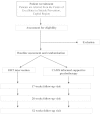The DiaS trial: dialectical behavior therapy versus collaborative assessment and management of suicidality on self-harm in patients with a recent suicide attempt and borderline personality disorder traits - study protocol for a randomized controlled trial
- PMID: 24885904
- PMCID: PMC4055911
- DOI: 10.1186/1745-6215-15-194
The DiaS trial: dialectical behavior therapy versus collaborative assessment and management of suicidality on self-harm in patients with a recent suicide attempt and borderline personality disorder traits - study protocol for a randomized controlled trial
Abstract
Background: In Denmark 8,000 to 10,000 people will attempt suicide each year. The Centre of Excellence in Suicide Prevention in the Capital Region of Denmark is treating patients with suicidal behavior, and a recent survey has shown that 30% of the patients are suffering from borderline personality disorder. The majority of patients (70% to 75%) with borderline personality disorder have a history of deliberate self-harm and 10% have a lifetime risk to die by suicide. The DiaS trial is comparing dialectical behavior therapy with collaborative assessment and management of suicidality-informed supportive psychotherapy, for the risk of repetition of deliberate self-harm in patients with a recent suicide attempt and personality traits within the spectrum of borderline personality disorder. Both treatments have previously shown effects in this group of patients on suicide ideation and self-harm compared with treatment as usual.
Methods/design: The trial is designed as a single-center, two-armed, parallel-group observer-blinded randomized clinical superiority trial. We will recruit 160 participants with a recent suicide attempt and at least two traits of the borderline personality disorder from the Centre of Excellence in Suicide Prevention, Capital Region of Denmark. Randomization will be performed though a centralized and computer-generated approach that conceals the randomization sequence. The interventions that are offered are a modified version of a dialectical behavior therapy program lasting 16 weeks versus collaborative assessment and management of suicidality-informed supportive psychotherapy, where the duration treatment will vary in accordance with established methods up to 16 weeks. The primary outcome measure is the ratio of deliberate self-harming acts including suicide attempts measured at week 28. Other exploratory outcomes are included such as severity of symptoms, suicide intention and ideation, depression, hopelessness, self-esteem, impulsivity, anger, and duration of respective treatments.
Trial registration: Clinical Trial.gov: NCT01512602.
Figures
References
-
- Suicide rates (per 100.000), by gender Denmark, 1950-2006- World Health Organization. [ http://www.who.int/mental_health/media/denm.pdf]
-
- American Psychiatric Association. Diagnostic and Statistical Manual of Mental Health Disorders. 4. Washington DC: APA; 1994.
-
- Gunderson JG. Borderline Personality Disorder: A Clinical Guide. Washington DC: American Psychiatric Press; 2001.
Publication types
MeSH terms
Associated data
LinkOut - more resources
Full Text Sources
Other Literature Sources
Medical


